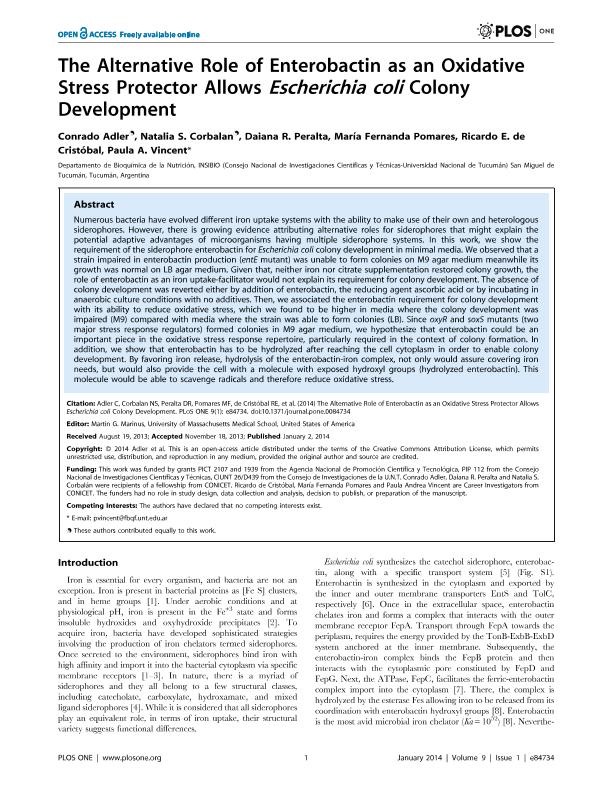Artículo
The Alternative Role of Enterobactin as an Oxidative Stress Protector Allows Escherichia coli Colony Development
Adler, Conrado ; Corbalan, Natalia Soledad
; Corbalan, Natalia Soledad ; Peralta, Daiana Romina
; Peralta, Daiana Romina ; Pomares, Maria Fernanda
; Pomares, Maria Fernanda ; de Cristobal, Ricardo Ezequiel
; de Cristobal, Ricardo Ezequiel ; Vincent, Paula Andrea
; Vincent, Paula Andrea
 ; Corbalan, Natalia Soledad
; Corbalan, Natalia Soledad ; Peralta, Daiana Romina
; Peralta, Daiana Romina ; Pomares, Maria Fernanda
; Pomares, Maria Fernanda ; de Cristobal, Ricardo Ezequiel
; de Cristobal, Ricardo Ezequiel ; Vincent, Paula Andrea
; Vincent, Paula Andrea
Fecha de publicación:
01/2014
Editorial:
Public Library of Science
Revista:
Plos One
ISSN:
1932-6203
Idioma:
Inglés
Tipo de recurso:
Artículo publicado
Clasificación temática:
Resumen
Numerous bacteria have evolved different iron uptake systems with the ability to make use of their own and heterologous siderophores. However, there is growing evidence attributing alternative roles for siderophores that might explain the potential adaptive advantages of microorganisms having multiple siderophore systems. In this work, we show the requirement of the siderophore enterobactin for Escherichia coli colony development in minimal media. We observed that a strain impaired in enterobactin production (entE mutant) was unable to form colonies on M9 agar medium meanwhile its growth was normal on LB agar medium. Given that, neither iron nor citrate supplementation restored colony growth, the role of enterobactin as an iron uptake-facilitator would not explain its requirement for colony development. The absence of colony development was reverted either by addition of enterobactin, the reducing agent ascorbic acid or by incubating in anaerobic culture conditions with no additives. Then, we associated the enterobactin requirement for colony development with its ability to reduce oxidative stress, which we found to be higher in media where the colony development was impaired (M9) compared with media where the strain was able to form colonies (LB). Since oxyR and soxS mutants (two major stress response regulators) formed colonies in M9 agar medium, we hypothesize that enterobactin could be an important piece in the oxidative stress response repertoire, particularly required in the context of colony formation. In addition, we show that enterobactin has to be hydrolyzed after reaching the cell cytoplasm in order to enable colony development. By favoring iron release, hydrolysis of the enterobactin-iron complex, not only would assure covering iron needs, but would also provide the cell with a molecule with exposed hydroxyl groups (hydrolyzed enterobactin). This molecule would be able to scavenge radicals and therefore reduce oxidative stress.
Palabras clave:
Enerobactin
,
Oxidative Stress
,
Colony Development
Archivos asociados
Licencia
Identificadores
Colecciones
Articulos(INSIBIO)
Articulos de INST.SUP.DE INVEST.BIOLOGICAS
Articulos de INST.SUP.DE INVEST.BIOLOGICAS
Citación
Adler, Conrado; Corbalan, Natalia Soledad; Peralta, Daiana Romina; Pomares, Maria Fernanda; de Cristobal, Ricardo Ezequiel; et al.; The Alternative Role of Enterobactin as an Oxidative Stress Protector Allows Escherichia coli Colony Development; Public Library of Science; Plos One; 9; 1; 1-2014; 1-10; e84734
Compartir
Altmétricas



